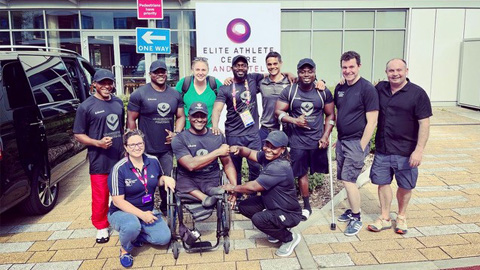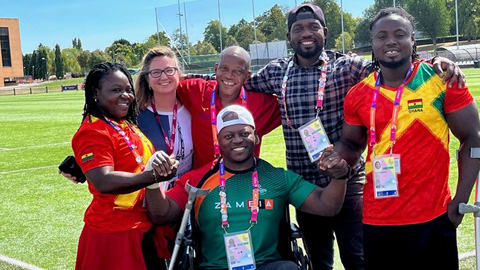Para Sport Against Stigma: Commonwealth Games athletes and coaches from Ghana and Zambia visit Loughborough University
Para Sport Against Stigma (PSAS) is a four-year project (2020-2024) that looks at how representation, education and communication in Para sport can challenge stigma associated with disability in Sub-Sarhan Africa. One part of PSAS focuses on Athlete Development and will see the International Paralympic Committee to deliver a programme to support National Paralympic Committees in Malawi, Ghana and Zambia to develop Para sport.
As part of the Athlete Development focus, on 7th and 8th August, Para-Powerlifters who represented Ghana and Zambia at the Birmingham Commonwealth Games 2022, along with their coaches, took the opportunity to visit and work with researchers and practitioners from Loughborough University and the International Paralympic Association.
Following a campus tour of the world class sport facilitates at Loughborough University, led by Nik Diaper, head of Para Sport, we had two days of workshops in the Elite Athlete Centre. One central aim of the visit and these workshops was to get a sense of the barriers, challenges, and enablers involved in athlete and coach development in Sub-Saharan countries. Convinced by the potential impact of the Para Sport Against Stigma project, the athletes and coaches were keen to share their personal experiences and advice. Researchers and practitioners were keen to listen and learn.
The athletes stressed the many benefits of participation in sport for people with disabilities in their countries, and how Para sport has given them opportunities to inspire younger people and help reduce stigma associated with disability. That said, they explained some of the big challenges and barriers to athlete development. We discussed, for instance, how limited opportunities to access funding and assistive technologies (i.e., adapted sports equipment) meant Para athletes in Sub-Sharan African have minimal exposure to competitions needed for development. The global disparities in Paralympic sport seem overwhelming.
The coaches highlighted that while they love being involved in Para sport it can be a challenge under difficult circumstances. The lack of coach education opportunities and limited options due to lack of recourses and funding were two major barriers. Funding, we heard, is a significant issue even for such basic things such as access to suitable sporting equipment, transport, and even the opportunities to appeal decisions while at competitions such as the Commonwealth Games.
Issues around the classification process is also a huge problem for both Para athletes and coaches in Sub-Saharan Africa. Again, lack of resources and the limited availably to national classifiers is a challenge to development. To help, Iain Gowans, a Loughborough University Doctoral Researcher, who was the Classification Manager at the British Paralympic Association, was on hand to share his experiences, insights, and advice. The classification processes, as Iain explained, is a complex issue in Paralympic sport, internationally, that needs addressing.
While the challenges to development are significant and inextricably linked to wider social and political inequalities that disabled people face Sub-Saharan Africa, the athletes and coaches were rich in ideas to overcome such barriers. Going forward we agreed that researchers and practitioners will work with Para athletes and coaches to develop the appropriate tools, recourses, networks, and knowledges to create meaningful change.
The wheelchair basketball game and such opportunities to bond and make friends were, of course, the highlight of the two days.

